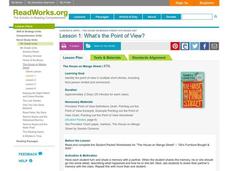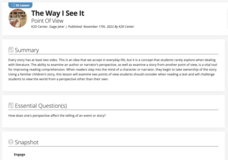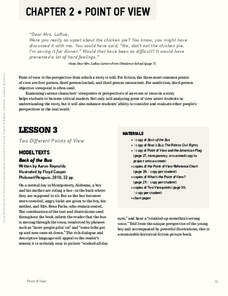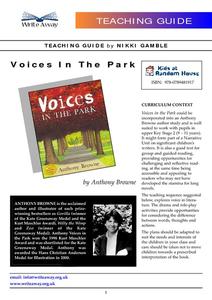Curated OER
What's the Point of View?
Sixth graders explain what a point of view is. They list two different types of examples of third person point of view and identify the difference between a third person limited and third person omniscient . Additionally, they read a...
Curated OER
Third Person Point of View
Have your class practice determining whose point of view is being utilized throughout the course of a story. They begin by working as a class to create a chart which will provide textual examples that describe first and third person...
Manchester College
What’s Your Point of View?
Work on deciphering the point of view of various pieces of literature. As readers review the concepts of first, second, and third person perspective, they apply what they know to different passages.
Curated OER
Points of View
Cinderella is a classic love story when Cinderella is the protagonist—but what happens if a stepsister tells the story? Focus on point of view with a lesson plan about fairy tales and story elements. After reading a few familiar fairy...
K20 LEARN
The Way I See It: Point of View
Robbers see a house from a different perspective than real estate agents. That's the big idea in a lesson about point of view. Groups assume the role of either robbers or real estate agents, note important details in a description of a...
Scholastic
Point of View
The point of view in a story can dramatically change the story itself. Focus on finding the points of view in various reading passages with a language arts packet, which includes fiction and nonfiction text.
PBS
The Power of Personal Narrative
Personal narratives are powerful things. Whether told from the first-person or third-person point of view, whether in the form of an essay, a short story, novel, or video, whether fiction or fact, they capture readers and give them...
EngageNY
Analyzing Point of View: Inferring about the Natural Disaster in Eight Days
Who is telling the story? Readers take a look at the text Eight Days to determine if the story is told in first or third person. They then discuss in groups and complete a shared writing activity to describe how the narrator's point of...
Write Away!
Voices In the Park
Explore the impact a narrator's point of view has on a story with a reading of the children's book, Voices in the Park by Anthony Browne. Written in four different voices, the story is told and retold from different perspectives to...
Premier Literacy
Point of View
Incorporate technology into a literature lesson with an innovative language arts lesson. Middle schoolers read an electronic version of original stories or fairy tales, and after determining the point of view, rewrite the tale from a...
Curated OER
Point of View
Fifth graders identify first and third person points of view in literature. In this point of view lesson students compare the point of view in different pieces of literature, some telling the same story. Students write a first-person...
EngageNY
Analyzing Point of View: Inferring about the Impact of Hurricane Katrina on People Living in New Orlean
What, where, how? Readers hone their analysis skills as they determine the narrator's point of view in Eight Days. They complete a literary analysis chart and essay to describe what and where events take place. Individuals then discuss...
Curated OER
Changing the Point of View
Fourth graders identify the point of view. In this point of view lesson students compare and contrast the point of view from third person omniscient and first person. Students rewrite a paragraph in an alternative point of view.
Curated OER
Genre Lesson: Biography/Autobiography
Practice distinguishing biography from autobiography through point of view. Tell a brief story of your morning. Have a class member retell the story to you (using second person). And have another retell the story to the class (using...
Curated OER
Writing Sentences Lesson Plan
Students explore first person and third person points of view. In this perspective instructional activity, students identify first person and third person points of view in literature they have read. Students rewrite stories from...
EngageNY
Mid-Unit Assessment: Analyzing a New Narrative about a Natural Disaster, Part II
See it through my eyes. Scholars complete mid-unit assessment part II by writing an essay describing how the narrator's point of view influences how the story is told in the text In the Middle of the Storm. Pupils also complete a...
Curated OER
Number the Stars, Lesson 11
Students analyze point of view in the novel Number the Stars. Their writing prompt is how would this chapter(11) be different if Peter were telling the story? Students create a class concept web about pride on the board.
Curated OER
Stephen Crane's "The Open Boat"
High schoolers examine the relationship of man and nature as portrayed in Stephen Crane's, The Open Boat." The third person, omniscient point of view, the depth of character analysis found in the story, and the emotions evoked by the...
Curated OER
Knowledge or Instinct? Jack London's "To Build a Fire"
Learners closely read " To Build a Fire," to explore the use of narrative point of view and debate the distinction between knowledge and instinct. The elements of literary naturalism and how they relate to Jack London's work is examined...
Curated OER
Nibble, Nibble, Little Mouse
Learners complete activities to analyze points of view in different texts. In this point of view lesson, students read Hansel and Gretel and The Magic Circle and discuss the points of view. Learners choose a character from the story and...
MENSA Education & Research Foundation
Magical Musical Tour: Using Lyrics to Teach Literary Elements
Language arts learners don't need a lecture about poetry; they listen to poetry every day on the radio! Apply skills from literary analysis to famous songs and beautiful lyrics with a lesson plan about literary devices. As class...
Curated OER
"Tomorrow and Tomorrow and Tomorrow"
Do you want to live forever? After reading Kurt Vonnegut’s short story, “Tomorrow and Tomorrow and Tomorrow,” class groups adopt the roles of an ethics committee, product manufacturers, concerned scientists, and potential users of an...
Curated OER
Laurence Yep's, Dragonwings
Students discuss vocabulary words and compare definitions. They read chapters 6-9 of the novel, Dragonwings, and discuss point of view, and complete a plot diagram. Then they review the four types of conflict and identify the conflicts...
Curated OER
Personalized Poetry Portfolio
Eighth graders create their own poetry portfolio containing poems that relate to Students' lives and families. The portfolio consist of the following types of poems: acrostic, diamante`, haiku, cinquain, and free verse.

























